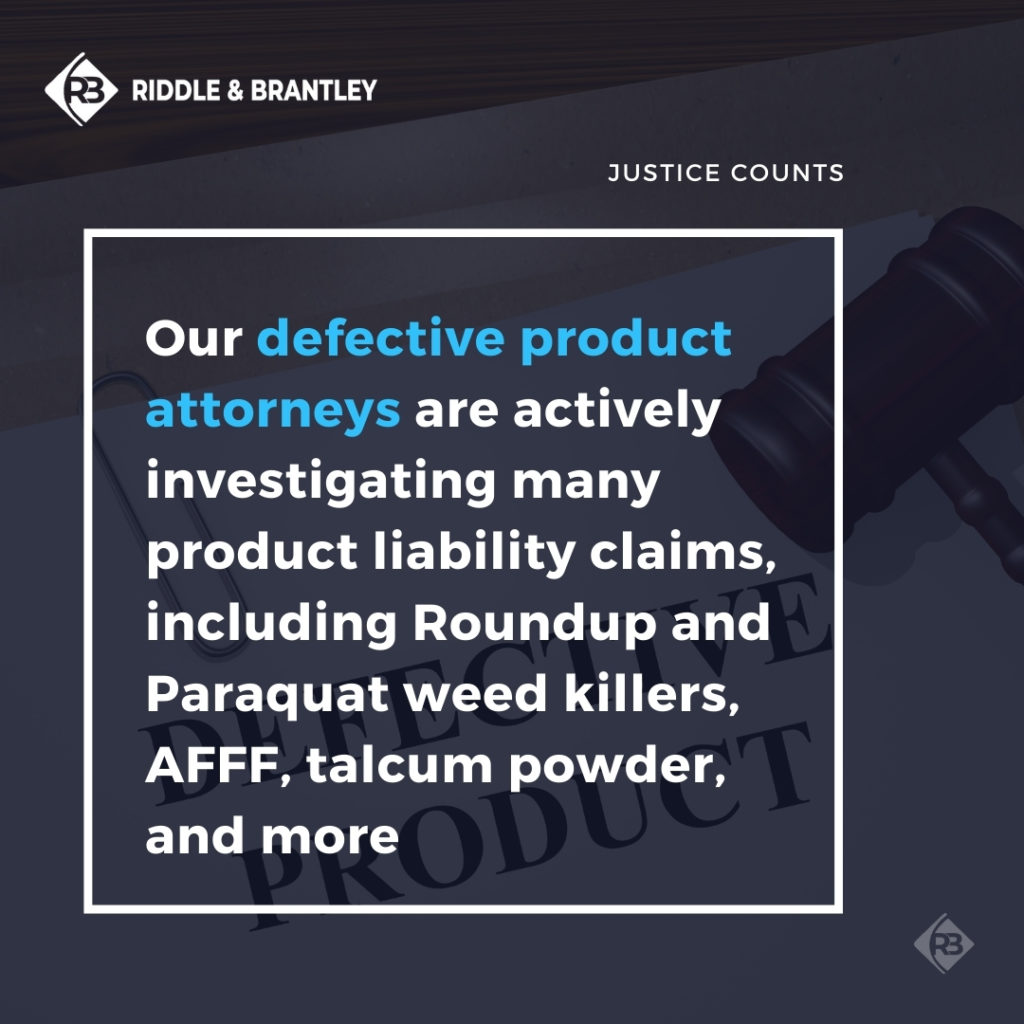North Carolina Product Liability Lawyer
Defective Product Lawyers
Product defects can affect almost anything you buy, use, or are exposed to. In recent years, our product liability lawyers have handled cases involving such products as Roundup weed killer, 3M earplugs for our military, Paraquat herbicide, Johnson & Johnson talcum powder, Similac and Enfamil baby formula, baby food, and AFFF “firefighting foam.” We’ve also handled cases involving defective airbags, car parts, children’s toys, and more.
Even buildings and other structures may contain design defects or manufacturing errors which can cause a serious accident.
 Companies that make and market consumer and commercial products must perform tests and take reasonable steps to ensure that their products are safe for users. However, some manufacturers may cut corners to increase profits or even knowingly sell dangerously defective products. As a result, many consumers suffer serious injuries or wrongful death. The product liability attorneys at Riddle & Brantley are committed to representing these victims and their loved ones, and getting them the justice and compensation they deserve.
Companies that make and market consumer and commercial products must perform tests and take reasonable steps to ensure that their products are safe for users. However, some manufacturers may cut corners to increase profits or even knowingly sell dangerously defective products. As a result, many consumers suffer serious injuries or wrongful death. The product liability attorneys at Riddle & Brantley are committed to representing these victims and their loved ones, and getting them the justice and compensation they deserve.
For a FREE, no-obligation consultation with an experienced product liability lawyer, call 1-800-525-7111 or complete the fast and easy form below.
There are no upfront costs and we don’t get paid unless you do. If we don’t recover compensation for you in your defective product case, you won’t pay any attorney fees. That’s our promise to you.
Call 1-800-525-7111 and let’s review your claim. You may be entitled to compensation and our product liability lawyers would love to help you.
Product Liability Lawyers Serving North Carolina and the United States
In addition to serving clients in our native North Carolina, we also handle all types of mass tort and class action cases for clients across the United States.

Holding Negligent Manufacturers Accountable
In more than three decades serving injury victims, our product liability lawyers have strived to hold negligent manufacturers accountable for defective products that cause injury or death. Our personal injury lawyers have over 220+ years of combined legal experience
While some companies issue product recalls after a certain number of incidents and reports, sometimes dangerous products such as 3M Combat Arms earplugs and Roundup weed killer remain on the market for years. If you or a loved one sustained injuries due to product defects, then you may be able to recover compensation through a product liability claim. This type of action may also help remove defective products from circulation, protecting others.
 Don’t wait — the longer you wait to contact a product liability attorney serving North Carolina and the greater United States, the harder it may be to win your case and receive the compensation you deserve.
Don’t wait — the longer you wait to contact a product liability attorney serving North Carolina and the greater United States, the harder it may be to win your case and receive the compensation you deserve.
For a FREE, no-obligation consultation with an experienced product liability lawyer handling defective product claims, please call 1-800-525-7111 today.
There is no obligation, there are no upfront costs, and we don’t get paid unless you do. If we don’t recover compensation for you in your defective product case, you won’t pay a dime in attorney fees. It’s as simple as that.
Call 1-800-525-7111 and let’s review your product liability case.
Types of Product Defects
Since virtually any product may contain a flaw, the exact nature of a dangerous defect can vary widely. However, liability in product defect claims generally depends on the source of the flaw.
There are 3 primary categories of product defects:
- Design defects — In some cases, the way a product is designed poses a danger to users. Certain medications may also contain design defects that cause serious health conditions or reactions. Generally, companies must perform exhaustive tests on these types of items to identify health risks. However, some companies overlook such tests or ignore the results.
- Manufacturing defects — Even if the design of an item is sound, negligence during the manufacturing process may cause deadly flaws. For example, the use of substandard materials and methods during the manufacture of tires can cause weak spots on the rubber. This increases the likelihood of a blowout.
- Insufficient labels — Some products are safe but only for a particular use. Therefore, manufacturers must include warning labels and clear instructions to prevent injuries. For example, medication labels must warn if the drug interacts poorly with other drugs. Failure to warn consumers with effective labels may cause a preventable injury.
Identifying the source of a defect requires an extensive investigation into the production process of an item. A North Carolina product liability lawyer from our law firm can take steps to find the liable party on your behalf.
Cases Our Product Liability Lawyers Are Investigating
Each year, hundreds of products are subject to recalls due to dangerous defects and/or failure to warn. In some cases, regulatory agencies like the Food and Drug Administration (FDA) issue these recalls or mandatory warnings. In other cases, the manufacturer may voluntarily recall defective products. However, a recall is not necessary to file a product liability claim.
Products that have been subject to recent lawsuits include:
Talcum Powder
Johnson & Johnson, makers of popular talc-based products, are facing dozens of lawsuits for dangerous talcum powder. Studies show that talc use can cause ovarian cancer and endometrial ovarian cancer, as well as mesothelioma. Additionally, the company may have known about these dangers for over 30 years but continued to market the product to women. In 2020, the FDA announced that it had discovered asbestos in Johnson & Johnson talcum powder, and the company subsequently announced it would stop selling talc-based products in North America.
AFFF “Firefighting Foam”
PFAS chemicals in AFFF “firefighting foam” may increase the risk of cancer among firefighters and property owners whose water is affected by runoff AFFF. We are actively investigating claims concerning testicular cancer and kidney cancer potentially linked to AFFF.
Paraquat Weed Killer
Paraquat is a toxic weed killer (herbicide) often used in groundskeeping and agriculture. Paraquat contains a compound known as MPTP, which is thought to be linked to the development of Parkinson’s Disease in those who have been exposed to Paraquat through ingestion, inhalation, or absorption through the skin. Our Paraquat lawyers can help those affected seek compensation for Parkinson’s disease potentially linked to this dangerous weed killer.
Roundup
Roundup is a popular herbicide (weed killer) used on farms and in residential settings. It contains glyphosate, a dangerous chemical that may cause cancer, including non-Hodgkins lymphoma and chronic lymphocytic leukemia (CLL). While most Roundup lawsuits have settled (or are involved in settlement negotiations), there may still be time to file a claim if your case meets certain criteria.
WanaBana Fruit Pouches
Elevated lead levels in certain WanaBana fruit puree pouches may cause lead poisoning in children, potentially causing serious developmental issues and other health problems. We are actively investigating these fruit pouch lead poisoning claims and are committed to holding the manufacturer accountable for any potential negligence or wrongdoing.
Baby Formula
Cow milk-based baby formula like Enfamil and Similac have been linked to increased risk for necrotizing enterocolitis (NEC) among infants. Infants born prematurely are especially at risk. We are actively investigating these heartbreaking baby formula claims and are ready to help however we can.
Baby Food
Research has revealed a potential link between heavy metal-contaminated baby food and higher risk for certain behavioral and cognitive problems, potentially including severe ADHD and autism. Our firm is actively investigating claims against baby food manufacturers including Gerber, Beech-Nut, Nurture, Campbell, and others.
Sunscreen
Many well-known brands of sunscreen (including Banana Boat, Neutrogena, CVS, Walgreens and more) have been found to contain benzene, a chemical known to cause cancer in humans. Benzene has been linked to leukemia and other blood cancers, among others. Our firm is actively investigating these cases and representing victims in potential sunscreen cancer lawsuits.
Hair Relaxers
Recent research has found a link between hair relaxers and chemical straightener products and an increased risk of uterine cancer. Our firm is actively investigating claims and representing clients in hair relaxer lawsuits.
Dangerous Drug Cases
In addition to handling dangerous and defective product claims, our attorneys also handle all kinds of cases involving dangerous drugs like Ozempic and other diabetes and weight loss drugs, Truvada, Belviq, and valsartan.
Defective Medical Devices
Our product liability attorneys also handle cases involving defective medical devices, including hernia mesh, Paragard IUD, Medtronic MiniMed insulin pumps, breast implants, IVC filters, Philips CPAP devices and ventilators, and more.
Important Deadlines in Product Liability Claims
Product Liability Claims in North Carolina
 The Statute of Limitations and Statute of Repose in North Carolina may determine whether you can pursue your product liability case. In North Carolina, an injured party has 3 years from the date of the accident or date of loss to settle or file a lawsuit. This is called our Statute of Limitations.
The Statute of Limitations and Statute of Repose in North Carolina may determine whether you can pursue your product liability case. In North Carolina, an injured party has 3 years from the date of the accident or date of loss to settle or file a lawsuit. This is called our Statute of Limitations.
However, North Carolina also has a Statute of Repose. This means that, regardless of the date of your loss or injury, a claim may not be made or brought after a certain period of time has run. In 2009, North Carolina extended the Statute of Repose from six years to twelve years for all claims that occur after October 1, 2009. This means that we cannot file suit for claims that arose as a result of actions that took place more than twelve years ago even if the actual injury takes place today unless the liable party engaged in fraud to prevent discovery of the defect.
Product Liability Claims in Other States
In mass tort cases that we handle, there are often different statutes of limitations, deadlines, and requirements depending on the state. If you believe you may qualify for a defective product lawsuit, call our product liability attorneys for a FREE consultation at 1-800-525-7111.
What Kinds of Products May Be Defective?
Our attorneys are experienced with a wide range of defective product liability cases, including:
- Car Parts (seatbelts, airbags, tires, etc.)
- Chemicals (herbicides, pesticides, industrial chemicals, commercial cleaners, etc.)
- Toys (bikes, wagons, etc.)
- Lawn Products (lawnmowers, etc.)
- Medicines & Pharmaceuticals
- Medical Devices and Equipment
- Electronics (televisions, stereos, hand-held devices, etc.)
- Factory Equipment
- Tools (power drills, etc.)
Talk with a Defective Product Lawyer Today
At Riddle & Brantley, our personal injury lawyers fight hard for justice for those injured due to defective products. If you believe manufacturing or design defects caused your injuries, then we can help. With offices across North Carolina and we the resources and knowledge to help clients in a variety of cases across the country, we are ready to help however we can. Our goal is delivering justice in the form of compensation to our clients to help them cover medical bills, lost wages, and pain and suffering.
For a FREE consultation, please call 1-800-525-7111 or complete the convenient form below. There are never any attorney fees unless we win your product liability case and you receive compensation. Call our product liability attorneys today and let’s review your claim. For a free, no-obligation consultation, please call 1-800-525-7111.
Results for Injured Victims
Since 1985, our attorneys have recovered millions of dollars in compensation for injury victims, including more than $600 million since 2000 alone (see disclaimer below). Our North Carolina product liability lawyers have been recognized by many prestigious organizations and awards (see disclaimer below), including:
- Multi-Million Dollar Advocates Forum (Gene Riddle and Darren Dawson)
- Million Dollar Advocates Forum (Gene Riddle and Darren Dawson)
- The National Trial Lawyers Top 100 (Gene Riddle and Darren Dawson)
- The National Association of Distinguished Counsel (Gene Riddle)
- AV Preeminent (Martindale-Hubbell) (Gene Riddle and Adam Smith)
- Super Lawyers (Gene Riddle, Adam Smith, and Darren Dawson)
- The Litigator Award (Gene Riddle)
“This settlement changed me and my family’s lives.”
–Linda B., Riddle & Brantley client
For a FREE, no-obligation consultation with an experienced product liability lawyer serving clients in North Carolina (and mass tort clients across the United States), please call 1-800-525-7111.
The consultation is free and you won’t pay any attorney fees unless we win your case and you receive compensation.
Call 1-800-525-7111 today and let’s review your claim.
*** Disclaimer: The results mentioned are intended to illustrate the type of cases handled by the firm. These results do not guarantee a similar outcome, and they should not be construed to constitute a promise or guarantee of a particular result in any particular case. Every case is different, and the outcome of any case depends upon a variety of factors unique to that case.
*** Disclaimer: An attorney must meet certain requirements to join these organizations or receive these awards. For more information on Membership Criteria for Million Dollar Advocates Forum, Multi-Million Dollar Advocates Forum, Super Lawyers, The National Trial Lawyers Top 100, The National Association of Distinguished Counsel, AV Preeminent by Martindale-Hubbell, the Litigator Award, and other memberships, awards, and accolades, please visit our Membership Criteria page. These awards and memberships should not be construed as a promise or guarantee of a similar result. Each case is different and must be evaluated separately.